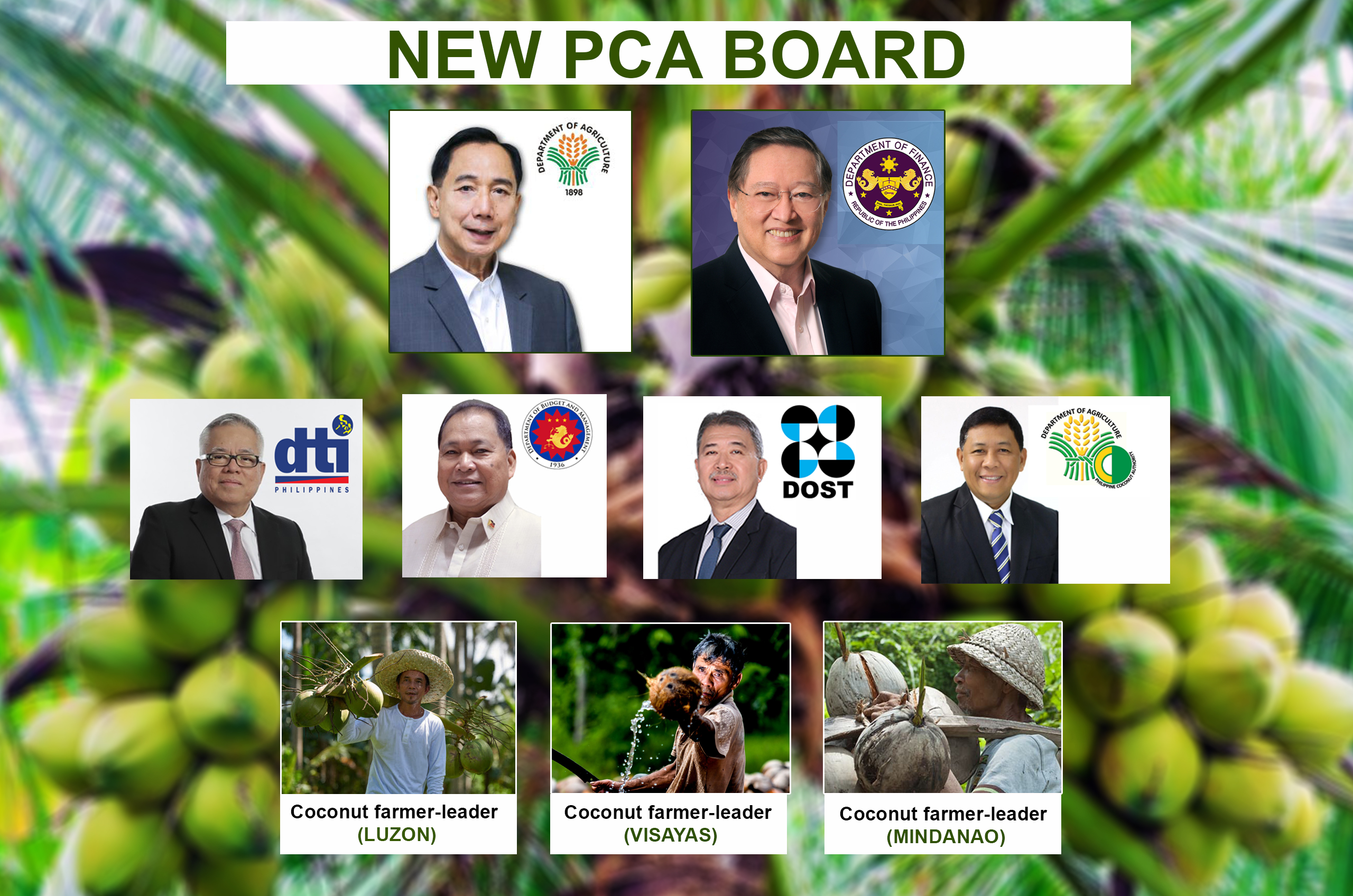
Two weeks after the signing of the “Coconut Farmers and Industry Trust Fund Act” or Republic Act No. 11524, the six government representatives of the reconstituted Philippine Coconut Authority (PCA) Board convened virtually, on March 15, 2021, to discuss the major provisions of the law that need to be undertaken by respective committees and government agencies that will oversee the completion of specific tasks.
The PCA Board – chaired by Agriculture Secretary William Dar, and assisted by Finance Secretary Carlos Dominguez as vice-chair – designated a corporate secretary and created a transition committee chaired by the Department of Trade and Industry (DTI) to help provide overall direction to ensure a coherent and coordinated approach to pursue plans for the development of the country’s coconut industry.
The board, which also serves as the Executive Committee (ExeCom), agreed that the transition committee will be absorbed later under the ExeCom.
Secretary Dar said the transition committee is tasked to help the ExeCom in transitional matters, including governance and management arrangements, and an initial program of work, each with prescribed timelines.
“We are jumpstarting the process that will modernize and industrialize the country’s coconut sector, and greatly improve its export earnings with more value-added products. This is a huge gamechanger, where all our efforts making use of the billion-peso coconut levy fund will lift our small coconut farmers and their families from abject poverty,” said Secretary Dar.
For his part, Secretary Dominguez said, “we at the Department of Finance (DOF) are privileged to be a member of the reconstituted PCA Board as the government revitalizes the coconut sector and leads it to President Duterte’s vision for agricultural modernization and financial inclusion for all Filipinos.”
“Finally, the P75-billion coconut levy fund will now directly benefit the country’s 2.5 million small coconut farmers and their families, by way of a trust fund to be used for yielding more value-added coconut products and unleashing the full economic potentials of this industry,” said Dominguez, who previously served as agriculture secretary during President Corazon Aquino’s term.
“We will ensure that the multibillion-peso coconut trust fund will be used for programs and projects meant to transform the coconut industry into a major contributor to our country’s strong and sustainable recovery from the adverse economic impact of the pandemic,” the finance chief added.
Also present during the board meeting were: DTI Secretary Ramon Lopez; Department of Budget and Management (DBM) Secretary Wendel Avisado; Department of Science and Technology (DOST) Secretary Fortunato dela Peña; and PCA Administrator Benjamin Madrigal, Jr.
To complete the nine-man PCA Board, the six government representatives will be joined soon by three coconut farmer-leaders – representing Luzon, Visayas, and Mindanao – who will be appointed by President Rodrigo Roa Duterte from four nominees for each island group.
During the meeting, PCA administrator Madrigal presented several items for Board approval, namely:
- Proposed selection process for farmer-representatives within 30 days;
- Completion of the coconut farmers registry within 90 days;
- Crafting of the Coconut Farmers and Industry Development Plan (CFIDP) to be submitted to President Duterte for approval within one 120 days; and
- Forging of memorandum of agreement between the PCA Board and several government agencies that will receive coconut trust fund allocation to implement various programs as provided for under RA 11524.
The Board approved the nomination and selection process of farmer-representatives, undergoing provincial and regional consultations with their respective coconut farmers’ organizations or associations, Madrigal said.
He assures coconut farmers that the DA-PCA is committed to meeting the deadlines to ensure the timely delivery of the benefits they so deserved.
“With the leadership and guidance of the newly- reconstituted and strengthened PCA Board, we are confident that the transformative reforms toward the modernization and industrialization of the coconut industry will be finally realized, directly benefiting millions of small coconut farmers,” Madrigal added.
Under RA 11524, a Coconut Farmers and Industry Trust Fund (or Trust Fund) is created, initially amounting to P75 billion, from the various coconut levy funds and assets held by the Bureau of Treasury (BTr) and cash held by the United Coconut Planters Bank (UCPB).
The law also created a trust fund management committee – with the DOF, DBM, and Department of Justice as members – tasked to set investment priorities, investment themes, asset allocation, and policies; evaluate assets; issue guidelines for portfolio turnover and CFITF management expenses; set annual allocation of the CFITF; and approve financial requirements.
The PCA Board also agreed on the major programs and projects that will be implemented using the P75-B CFITF. These include:
- Development of hybrid coconut seed farms and nursery for planting and replanting;
- Shared facilities for processing;
- Farm improvements through diversification and/or intercropping with livestock, dairy, poultry, and cacao;
- Credit programs and crop insurance;
- Infrastructure development;
- Organization and empowerment of coconut farmers’ organizations and cooperatives; • Industry research, marketing, and promotion; and
- Trainings, scholarships, and health and medical programs for coconut farmers and their families.
For these initiatives, P10 billion (B) will be allocated this year, and another P10 B in 2022, P15-B each in 2023 and 2024, and P25-B in 2025. ### (DA StratComms / DA-PCA)














